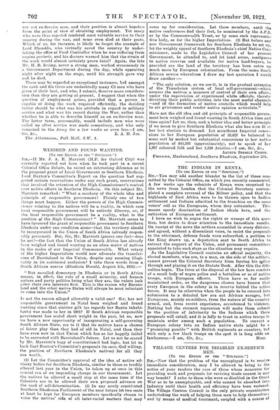WEIGHED AND FOUND WANTING. [To THE EDITOR OF THE "
SPECTATOR."] SIR,—If Mr. J. A. R. Marriott (M.P. for Oxford City) was correctly reported out here when he took part in a recent Colonial Office Debate, he raised an interesting dilemma as to the proposed grant of Local Government to Southern Rhodesia.
Lord Buxton's Committee's Report on the question had sug- gested certain reservations under any such grant, reservations that involved the retention of the High Commissioner's control over native affairs in Southern Rhodesia. On this subject Mr. Marriott remarked : " What a mockery of the whole idea and principle of responsible government! Plainly one of two things must happen. Either the powers of the High Commis- sioner relating to the natives will be a reality, in which case local responsible government will be entirely illusory, or, if the local responsible government be a reality, what is the position of the High Commissioner? " Mr. Marriott seems to have favoured the grant of responsible government to Southern Rhodesia under one condition alone—that the territory should be incorporated in the Union of South Africa (already respon- sibly governed). But, Sir, Mr. Marriott ignores one fact—does he not?—the fact that the Union of South Africa. has already been weighed and found wanting as an alma mater of natives in the scales of our Imperial Commonwealth. What votary of the higher Imperialism would now advocate the transfer- ence of Basutoland to the Union, despite any seeming illogi- cality in its continued exclusion? I take these words from a South African source (Rhodesia Iferald, August 5th, 1921) :- " But so-called democracy in Rhodesia or in South Africa means, in effect, the rule of a small minority, and human nature and party politics being what they are, the rulers look after their own interests first. This is the reason why Basuto- land and the other native States will always be most reluctant to come into the Union."
Is not the reason alleged allowably a valid one? Sir, has not responsible government in Natal been weighed and found wanting since that sinister gift (as regards her Bantu inhabi- tants) was made to her in 1893? If South African responsible government has scaled short weight in the past, let us, now we have a new opportunity of inaugurating a self-governing South African State, see to it that its natives have a chance of fairer play than they had of old in Natal, and than they have even now in that Union which has so far happily failed to be entrusted with Basutoland's future. Let us not be scared by Mr. Marriott's bogy of constitutional bad logic, but let us back Earl Buxton's Committee's proposals (to save, God willing, the position of Southern Rhodesia's natives) for all they are worth.
(1) Let the Committee's approval of the idea of native ad- visory bodies for Southern Rhodesia, similar to those so tardily allowed last year in the Union, be taken up at once in this crucial era of an impending change in our Government. Let the natives be allowed a small step at the same time if the Colonists are to be allowed their own proposed advance on the road of self-determination. (2) In any newly constituted Southern Rhodesian Parliament of the near future let two seats at least be kept for European members specifically chosen to voice the natives' side of all inter-racial matters that may
come up for consideration. Let these members, until the native conferences find their feet, be nominated by the A.P.F. or by the Commonwealth Trust, or by some such representa- tive body, as for the higher Imperialism. (3) But before any new Government framework for Southern Rhodesia be set up, let the weighty appeal of Southern Rhodesia's chief Native Com- missioner, made to the Legislative Council of her present Government, be attended to, and let land areas, contiguous to native reserves and available for native land-buyers, be provided ere the land of the territory has been eaten up much more by European colonization. From the 'same South African source wherefrom I drew my last quotation I would draw another :— " The only solution, as we see- it, is in the gradual extension of the Transkeian system of local self-government—which assures the natives a measure of control of their own affairs, under the supervision of experienced white officials, thereby diverting their public activities into the most useful channels —and in the formation of native councils which would help to air grievances and render native opinion articulate."
Have not the old idea and old principle of responsible govern- ment been weighed and found wanting in South Africa time and time again? Let us, then, seek a better idea and better principle if we mean to give Southern Rhodesia what she has seen fit at her last election to demand. Let munificent Imperial conces- sions to her European population of 33,621 be balanced in some sort by modest but substantial concessions to her native population of 845,593 (approximately), not to speak of her. 1,997 coloured folk and her 1,250 Asiatics.—I am, Sir, &c.,
ARTHUR SHIMMY CRIPPS.
Umvuma, Mashonaland, Southern Rhodesia, September 5th.










































 Previous page
Previous page